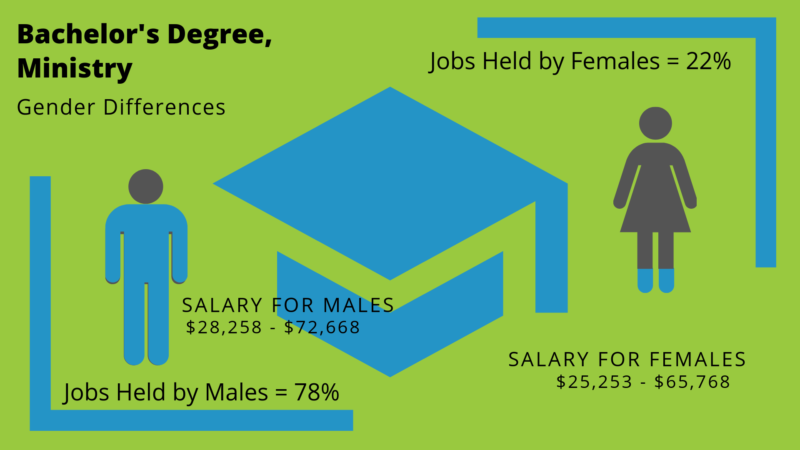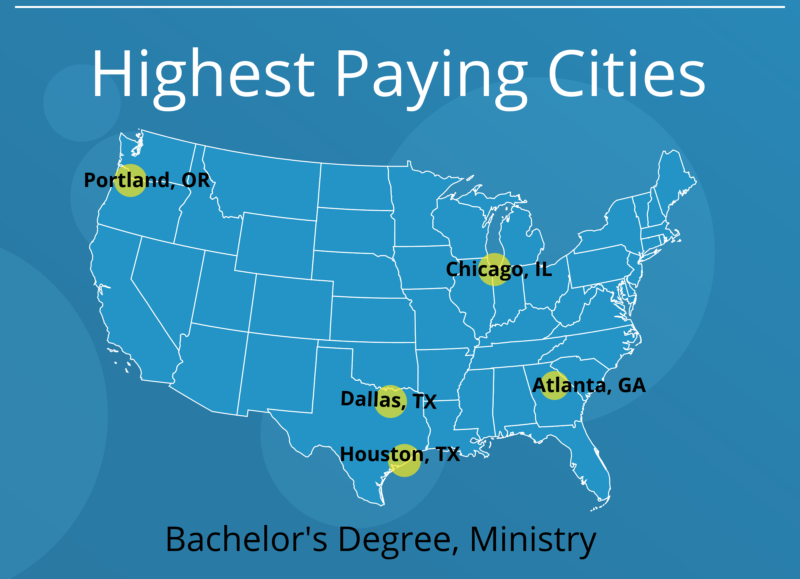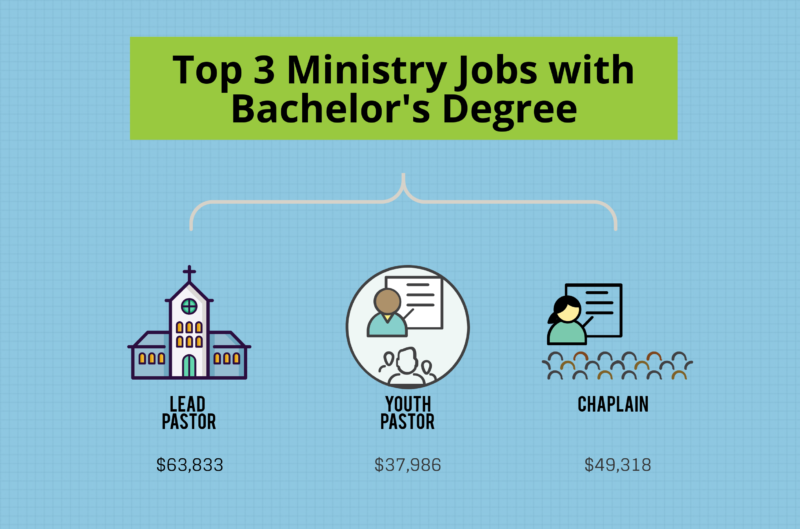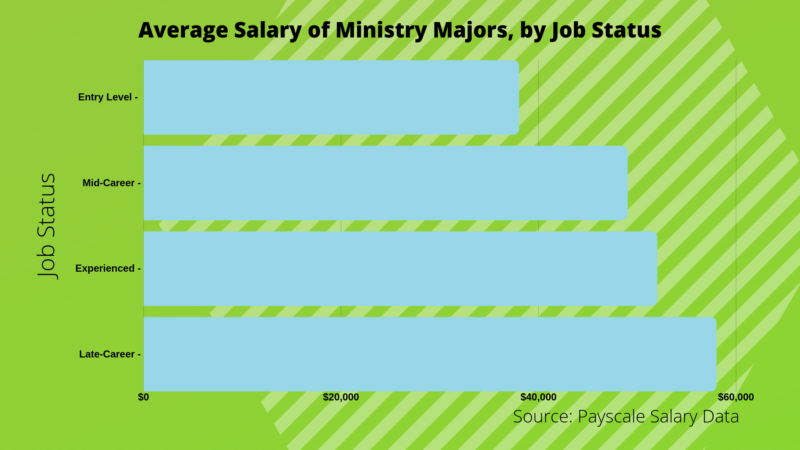Key Information:
- A ministry degree offers diverse opportunities, not only in religious fields but also in secular jobs.
- A bachelor’s in ministry often integrate leadership training with theological studies, which can be applied in various professional contexts.
- Graduates can work in church management, counseling, or community leadership, among other roles.
Many people wonder how to become a minister or ask what can I do with a biblical studies degree. Many of those same people may not even know about the educational path towards a ministry degree. A bachelor’s in Ministry will prepare a student to work in or with church organizations in various capacities.
For some people who wonder how to become a minister, the question comes from a calling they cannot quite define. In many faiths, this is known as a “call to ministry.” For some others, the question comes from a strong desire to want to further engage in their faiths by becoming leaders and taking on larger challenges that concern their faiths.
However, obtaining Bachelor’s in Ministry degree is not just for people who want to pursue a career in a spiritual field. A ministry degree also offers secular opportunities and various other career paths. This is because a ministry degree is not strictly just a faith-based education.
Related Rankings:
- Best Bachelor’s in Ministry Degree Programs
- Best Online Ministry Degree Bachelor’s Programs
- Fastest Online Ministry Degree Bachelor’s Programs
- Most Affordable Online Ministry Degree Bachelor Programs

Why Should I Consider a Bachelor’s In Ministry Degree?
A ministry degree is not just a theology degree; it is also, in many ways, an education in leadership, and so it has a certain amount of flexibility that graduates can take advantage of. Depending on the school, a ministry degree may have significant overlap with programs like business administration, management, and leadership. Those skills can help anyone position themselves in leadership positions within their faith and outside it.
Also, people who wonder how to become a minister may also have some questions concerning terminology. For example, consider the reverend vs pastor, or the minister vs pastor questions. For the minister vs pastor question, the terms can sometimes seem interchangeable. Nevertheless, there are differences between these terms depending on denomination. Mostly, a pastor represents a leader of a flock. The word pastor is derived from the Latin word for “shepherd.” Heads or leads of a church can receive the title of pastor. Sometimes, the pastor represents a position rather than a title.
In Catholic faiths, the term pastor typically refers to a parish priest, which is something altogether different. By contrast, a minister, which means preacher, is someone who receives their denomination’s authorization to perform a wide variety of functions, such as tending to the sick, advising church members, or organizing the business of the church.
To put it more plainly, a pastor can be a minister, but a minister is not always a pastor. It is possible to gain the title of minister without ever performing any church duties.
A distinction exists for the reverend vs pastor question as well. The term can mean different things depending on faith and denomination. Usually, reverend represents an honorific that any member of the clergy can earn through some form of merit or another. In some other denominations, the term strictly applies to church leaders. In all cases, a minister, depending on denomination, can also gain the titles of reverend or pastor. So if you ask how to become a minister, the answer depends on the church and faith you belong to.
What Schools Offer a Bachelor’s in Ministry Degree?
It is easy to think only faith-based schools and programs offer ministry degrees, but the truth is ministry degree programs are found practically everywhere. As a ministry degree is a theology degree, many secular or unaligned educational programs offer them. Nevertheless, there are numerous faith-based colleges and programs available, as well as many online ministry degree programs.
For applicants who want an education steeped in a specific ideology, denomination, or faith-based niche, a good place to start is by looking at the ministerial guidelines for their own church. Many denominations want and expect their ministers to attend specific types of schools or programs.
Generally speaking, it is usually possible to find a qualified school or program no matter the denomination of the applicant. And, as with any school, college, university, or program, applicants must do their due diligence to make sure they receive a good high-quality education from a reputable school.
Accreditation for Ministry Programs and Degrees
As with any higher learning educational opportunity, the best way to determine which school will offer a quality education is to look at who gives the school or program accreditation. An intact accredited status should tell applicants quite a few things about a ministry degree program:
- The institution has a clear purpose and goal
- The institution hires highly qualified instructors and staff
- The institution has everything a student needs to meet goals
- The institution constantly strives for improvement and excellence
- The institution meets or exceeds standards set by the accreditation agency
Regional accreditation agencies set educational standards for most colleges and universities in the country. Each region of the country has a dedicated accreditation agency, hence the term regional.
Accreditation from a regional agency means the school meets or exceeds educational standards set by the accrediting group. Schools must willingly submit an application for accreditation and maintain their standing with their regional accreditation group.
Regional accreditation has the highest recognition and it can help students that want or need to transfer to other schools for their education. This is because credits from regionally accredited schools are widely accepted at other schools.
Regional accreditation is not the only type of accreditation to look for. This is especially true for those seeking a certain type of ministry degree or a specific type of education based on a denomination. Other, specialized or programmatic accreditations can also help an applicant decide if a school or ministry degree program is the right one for their needs.
For ministry degrees, there are numerous specialized and programmatic accreditation agencies. Applicants may even find their own church or faith group appreciates ministry degrees from a school or program with a specific type of accreditation.
Generally, the most recognized accreditation agencies for ministry programs include:
- Association for Biblical Higher Education
- Association of Theological Schools in the United States and Canada
- Transnational Association of Christian Colleges and Schools
By far, the most known and respected ministry degree accreditation agency is the Association for Biblical Higher Education.
This does not diminish the other accrediting agencies, as applicants will need to look at more than just the accreditation status of a school or program. However, applicants should look up any accreditation agency a ministry degree program lists so they can see what exactly that accreditation status entails. Any legitimate accreditation should ensure that the school has been vetted by an independent third party.

What Are the Different Types of Ministerial Degrees Available?
Numerous types of ministerial degrees exist. In addition, many ministerial degrees do not fall under the title of Bachelor of Arts in Ministerial Studies. Once again, the types of ministry degrees can have a lot to do with the denomination or faith-based niches. In addition, the degree can also come with any of a number of specializations.
Sometimes, what people think of as a ministry degree is really a divinity degree. A BS in Theology can also represent a ministry degree if that theology major has a faith-based specialization. Another example comes with degrees in biblical studies.
Biblical studies degrees can also represent a viable ministry degree, but the education that accompanies these degrees is geared towards the Bible specifically. Careers in ministry can start from any type of ministry degree.
Applicants must pay close attention to what the curriculum for any ministry or theology degree is offering. This is especially true if the applicant is seeking an education that adheres specifically to a denomination or other narrowly defined group.
Specializations also matter as well when it comes to the types of ministry degrees available. Someone specifically looking for pastor education for a Protestant congregation should make sure they‘re taking courses that will give them the best chance at becoming a church leader, as opposed to just a biblical scholar. Whether it is pastor education or some other form of theological study, a specialization can put an applicant in a good position to achieve their goals.
Some Ministry degree specializations can include:
- Biblical Counseling
- Chaplaincy
- Christian Leadership
- Christian Philosophy
- Christian Studies
- Church Ministry
- Evangelism
- Intercultural Ministries
- Ministerial/Ministry Leadership
- Pastoral Ministry
- Youth Ministry
The list of available specializations is long, which means applicants can find programs that offer courses that will give them the best possible education that meets their personal criteria and goals.
There are many approaches to a Christian ministry program, and ministry majors may take coursework in
- family ministry
- intercultural studies
- Christian faith
- Old Testament
- New Testament
- Biblical interpretation
- Local church outreach
- Nonprofit management
You don’t have to go to an on-campus Christian university either — you can choose an online bachelor program.
Can I Earn My Ministry Degree Online?
Gaining a ministry degree online works in much the same way as pursuing a ministry degree through traditional campus classes or programs. The same rules apply for choosing a ministry degree online as well. Careers in ministry can definitely start with an online ministry degree program, so applicants should not worry that choosing a ministry degree online will lessen their chances or mess up their goals. An online degree completion program can take as little as two years if you’re working full-time, and a little longer studying part-time.
This all applies to other types of ministry degrees as well. Applicants can just as easily pursue a biblical studies degree online or an online theology degree Catholic denominations will accept. Just as with brick and mortar programs, applicants must vet the online schools and check their status.
Online programs will offer the same general education courses and electives as a campus-based program, and the same number of credit hours. If you already have an associate degree, you may shave off some time by skipping some online courses. Some online programs also set students up with mentors.
Accredited online bible college degrees will have the same guidelines and standards. An online theology degree Catholic parishes want will still need proper accreditation. Getting a theology, ministry, or biblical studies degree online will take just as much effort from applicants. Accelerated programs are highly demanding, but faster.
Other than accredited online bible college degrees and other programs, applicants can also seek out some of the free online ministry degrees and certificates out there. Applicants should understand many places offer some form of online ministry degree free of charge, but those degrees are not always accepted by a church.
Occasionally, free online ministry degrees can help an applicant earn credits towards an accredited degree or some form of certification. Claims of an online ministry degree free can also mean the program has a very low cost or will need the applicant to pay a fee of some sort before they can graduate the program.
When checking out free online ministry degree courses, classes, and programs, it is still a good idea to check for some form of accreditation. For example, free accredited online seminary degrees will still need the applicant to figure out what group gave the accreditation and what that accreditation means.
A good online program will also set you up for a master’s degree or doctoral program.
What Type of Ministry Certifications or Ministry Licenses Will I Need?
Depending on the goals of the applicant, some certification or licensing may become necessary. Of course, the major license for ministry and certificate in ministry is ordination. Many people wonder how to become an ordained minister. However, the answer to the question will depend on what type of ordination the applicant wants.
When searching for how to become an ordained minister, applicants will likely come across a slew of websites and conflicting information. An online ministry certificate may help someone officiate a wedding or a funeral, but if the applicant does not receive ordination from his or her group or denomination, then he or she cannot claim the title of ordained minister for that group or denomination.
A licensed minister is not the same as an ordained minister in many cases. Some states grant ministry licenses, which can allow a minister to practice certain functions within that state. Nevertheless, the state license is not a form of ordination.
Generally, a state-licensed minister can perform weddings, work in public institutions, such as jails, and do other things the state requires licensing for. Yet, a license for ministry from the state can require a graduate to already have an ordination certificate in ministry already.
The subject of licensing and certification can become quite confusing. This is especially true for denominations that require extra steps to gain ordained status.
The best thing an applicant or graduate can do is to find out the ordination requirements for their particular group while also checking with the licensing requirements for their state. A certificate, whether it is an online ministry certificate or not, and a license for ministry typically work with each other. Graduates should try to obtain both if needed and possible.
Some specific groups or organizations may also want a graduate to obtain specialized certification through their own program. This is a wholly different scenario and will depend on the groups the graduate is trying to join or work with.

What Are the Different Types of Careers in Ministry?
It may not seem like it on the surface, but the types of careers in ministry are wide and varied. Jobs in the ministry exist and other ministerial jobs as well. For those who want to lead a congregation, lead pastor jobs do show up. In addition, graduates can start the process of building their own congregations if their denominations allow.
Lead pastor jobs and jobs for ordained ministers aside, there are many ministry career opportunities that exist in secular businesses and programs as well. A ministry degree can come with leadership classes, things like musical history, and other forms of education that can lead to careers with jobs in the ministry or careers completely outside the scope of ministerial jobs.
Some ministry career opportunities and jobs in ministry specifically can include:
- Church Administrator
- Counselor or Youth Counselor
- Member of the Clergy
- Ministerial Educator
- Missionary
- Pastor or Youth Pastor
- Religious Activities Director
- Teacher (Philosophy, Theology, or Religious)
Many other career paths exist as well when it comes to jobs in the ministry. Not all jobs entail the same things. Graduates need to consider the job requirements carefully when looking for ministry careers. For example, a youth pastor job description is not the same across all denominations or in all places.
The different types of careers in ministry are not always what someone may think of as careers that involve serving God. However, faith institutions can require a ton of people working in different fields and sectors to achieve goals, stay relevant, and deal with the administration that comes with running small and large organizations.
Applicants should always keep in mind a ministry degree also makes them eligible and highly qualified for many secular occupations. Occasionally, businesses specifically seek out those who can perform a job while still bringing a faith-based aspect to it.
What Kind of Salary Can I Earn with a Bachelor’s In Ministry Degree?
The salaries earned by those in ministry can vary a great deal based on a tremendous number of factors. Some people assume faith-based careers barely pay at all, but, in truth, there are many religious jobs that pay well.
Some highly sought-after positions can pay a minister salary worthy of the work the applicant put into achieving their bachelor’s degree in ministry. $47k is the median wage for clergy. The average general minister salary is $52k. Average youth pastor salary or youth minister salary hovers around $37k.
People often wonder how much do youth pastors make. Typically, they make less than general pastors do at any given time. Even faith organizations can have a hard time trying to figure out how to determine pastor salary, whether it is how much do youth pastors make or how much do small church pastors make.
When looking at the salary numbers, job seekers should bear in mind these numbers represent averages. Salary can start or grow far beyond the average rates depending on things like location, the organization involved, and the needs of that organization. A youth minister salary or average youth pastor salary in one place can double in another place.
Also, church minister salary is one thing, but the salary for specialist positions can come with very high pay. In most cases, graduates will not start with a pastor salary megachurch congregations fund.
A small church pastor salary may require a graduate to use their degree in other ways to supplement it. For example, a small church pastor salary can work well with a religious teaching assignment or faith-based freelance writing.
For many who receive the call, salary is not the most important part of their ministry careers. Nevertheless, it is still important to consider salary. Helping, healing, preaching, and guiding people can offer mental and spiritual rewards. But, a good salary or good opportunities to make more money can help ease any burdens for graduates and their families.

Are There Any Professional Organizations For Ministry Degree Holders?
The ministry space comes with a lot of professional organizations. The very nature of faith organizations and denominations means there are a stunning number of both broad and niche professional organizations out there for ministry degree holders. These organizations exist as the local, state, national, and international levels.
Because of the sheer amount of these organizations, ministry degree graduates should focus on finding the organizations that will benefit them best. No matter what, it is always a good idea to become part of a professional membership organization for a multitude of reasons. These associations can provide:
- Conferences, seminars, and programs
- Live forum to exchange ideas with other ministry professionals
- Networking opportunities
- Opportunities for career advancement
- Opportunities for further education
Sometimes, these organizations create policy and contain ministry leaders. Professional associations can also come with exclusive resources graduates can take advantage of. Altogether, these groups are well worth it for anyone who wants to learn, grow, advance, or find new ways to improve things for their church or religious institution.
Often, businesses and other groups seeking a faith-based counselor or someone to speak at an event will contact a professional organization first. The networking and sharing of information can help a minister or other ministry-related professional stay afloat. This can become extremely important for ministers and pastors of small churches.
For people seeking the right professional organization, it can help to narrow the search down to specifics. For example, a graduate who will practice ministry within a Catholic institution should look for Catholic organizations.
If that job seeker specifically wants to deal with youth ministry, they can find a Catholic youth ministry organization. If that person worked with Catholic youths in an educational capacity, they could seek out a Catholic educational society.
The opposite is also true. Ministry degree graduates with a broader focus on religion or theology can join professional organizations that also have a broader focus. Even within the broader religious categories, subcategories exist.
A good way for a ministry degree graduate to figure it all out is to contact and speak with others at the local level. The people they will work with or around may have some ideas as well. If part of a specific denomination, other ministry-professionals within that denomination will likely have some good ideas on which organizations to consider.
